#and the look to stefanchuk
Text
THE moment 😍😍😍😍😍😍😍😍😍
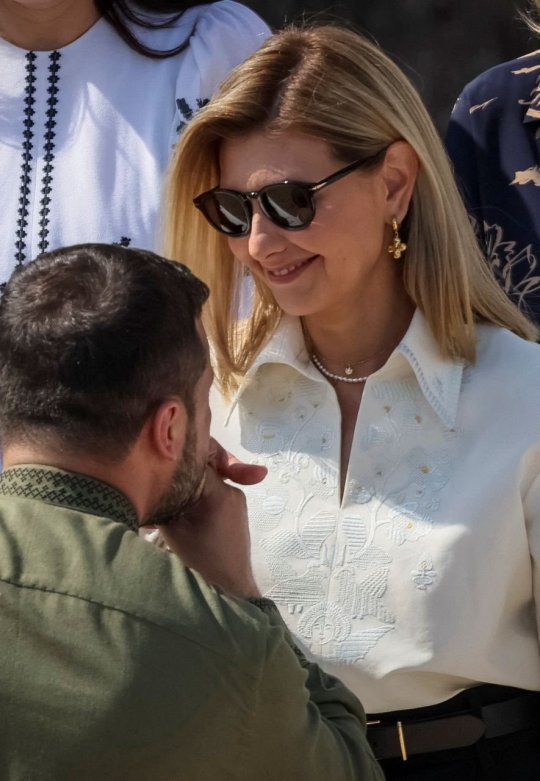
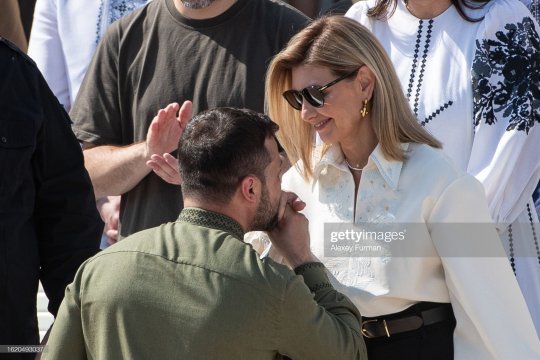
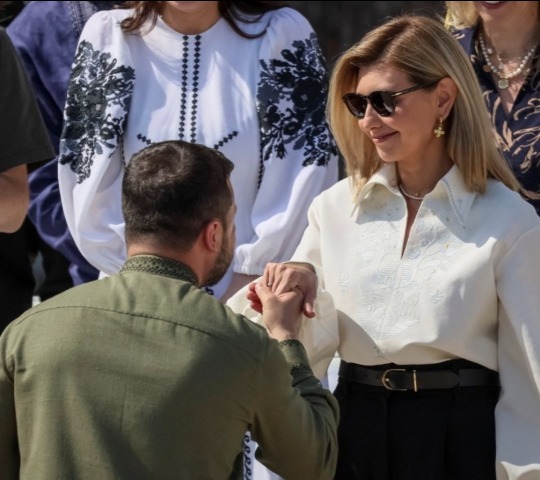
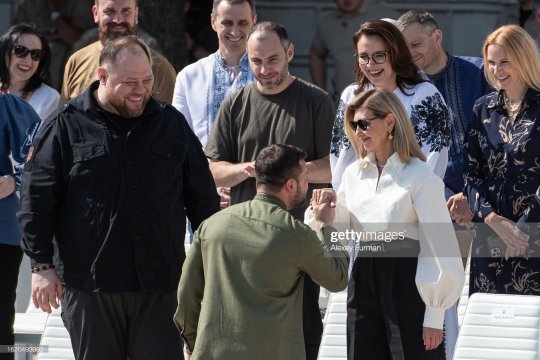
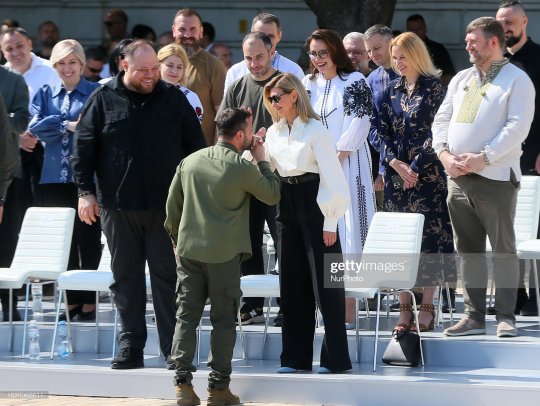
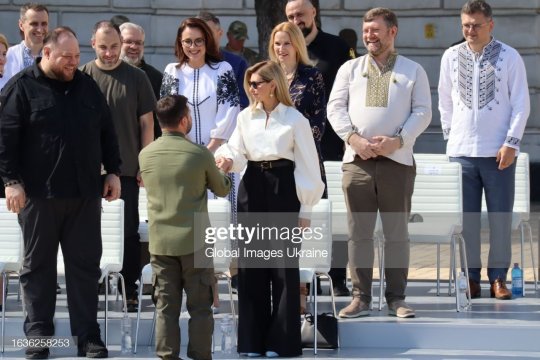
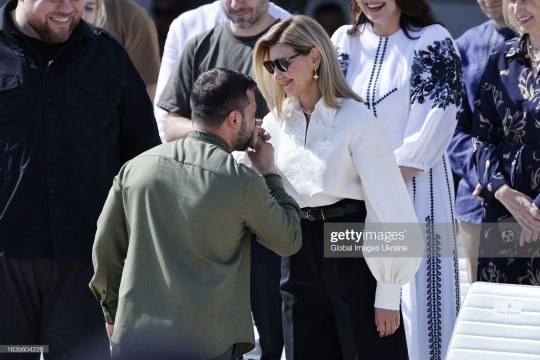
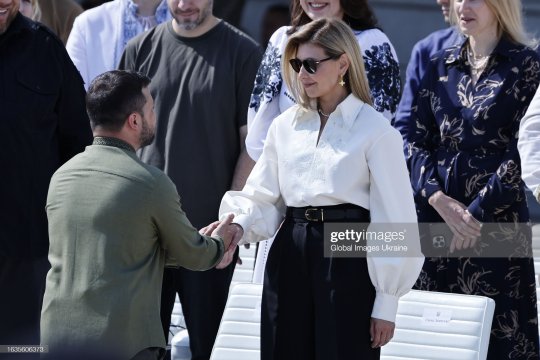
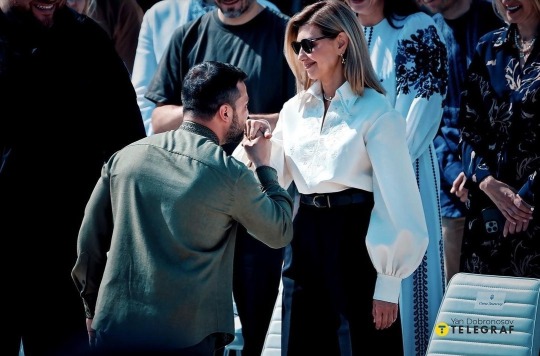
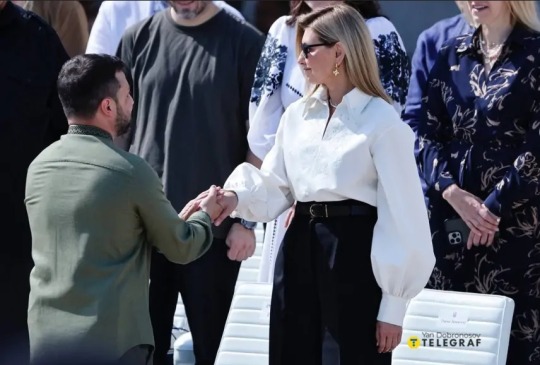
#WHAT DO YOU MEAN AM I OKAY#OF COURSE IM NOT OKAY#LISTEN#EVERYONE#WE DONT TALK ABOUT THE AMOUNt OF TIMES IVE WATCHED THAT VIDEO#IN THE HISTORY OF VOLENA MOMENT THIS IS A VOLENA VOLENA MOMENT#IT HAS EVERYTHING#ZE BEING A GENTLEMAN#LOOOOOOOOVE#THEM BEING FREAKING SWEET WITH EACH OTHER#OLENA TEASING HIM#i love that you can see the exact moment vova realizes he fucked up#also olenas glaaaaaaaare 😂😂😂😂😂😂😂#vova felt that glare through the sun glasses 😂#also the slight raise of the olenas eyebrow#and the look to stefanchuk#“can you believe my husband ruslan?!”#“un-be-lie-vable 🤨🤨🤨”#also how she withdraws her hand but vova quickly reaches for it and grabs it 😄#and olenas little smirk#that turns into a full big smile when hE KISSES HER HAND 🥰🥰🥰🥰🥰🥰🥰🥰🥰🥰🥰🥰🥰#I ALSO REALIZED WITH THE PICTURES HE GRABBED HER HAND IN A WAY SO HE WAS TOUCHING THE RING#AND IT LOOKS LIKE HE ACTUALLY PRESSES THE KISS ON THE WEDDING RING#AND HOW HE CARESSES HER HAND BEFORE KISSING IT 🥹🥹🥹🥹🥹🥹🥹🥹🥹🥹#AND HOW OLENA IMMEDITATELY LEANS TOWARDS HIM WHEN HE KISSES HER HAND#ALSO THAT FELT SO NATURAL BETWEEN THEM#THATS NOT THE FIRST TIME HE DID THIS#also how he continues to hold her hand when he continues walking#I HAVE A LOT OF EMOTIONS ABOUT THAT#SCREAMING CRYING DYING
24 notes
·
View notes
Text
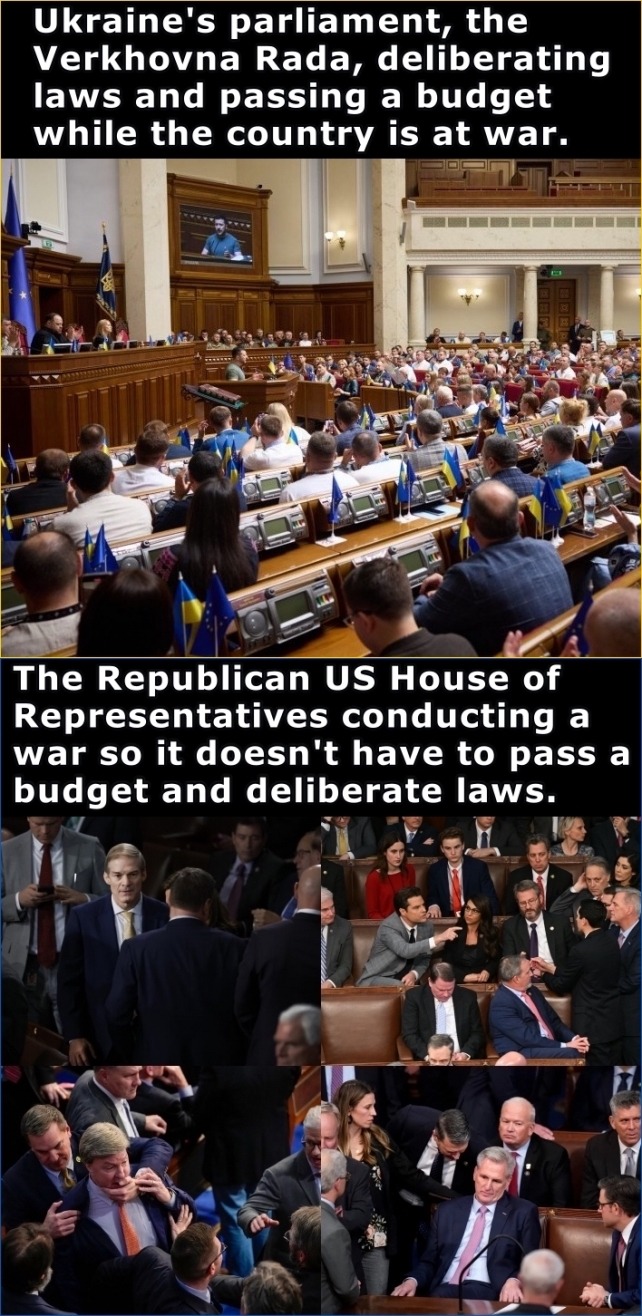
The GOP-run House of Representatives has been without a Speaker since Tuesday 03 October 2023.
In Ukraine, Ruslan Stefanchuk (Руслан Стефанчук) has been Chairman of the Verkhovna Rada (Верховна Рада) since 08 October 2021. He got the position just one day after his predecessor had been voted out by the ruling Sluha Narodu Party over policy differences. By comparison, it's about three weeks since Kevin McCarthy was voted out of the Speaker's chair.
So this is another reason why the House Putin Caucus doesn't like Ukraine – its national parliament make them look like even bigger fools.
Speaking of Ukraine, there is still a war going on there against Putin's genocidal invaders. If the blanket coverage of the Middle East has kept you from hearing the latest on Ukraine, here's an opportunity to catch up on the last few days. It's mostly good news. 🇺🇦
A secret weapons delivery and a cross-river raid: Here's what to know about the latest in Ukraine
youtube
#us house of representatives#speaker of the house#republicans#republicans in disarray#kevin mccarthy#matt gaetz#gym jordan#house putin caucus#republicans can't govern#ukraine#verkhovna rada#representative democracy#invasion of ukraine#stand with ukraine#vladimir putin#russia's war of aggression#россия - террористическая страна#��ладимир путин#путин хуйло#россия проигрывает войну#руки прочь от украины!#геть з україни#вторгнення оркостану в україну#україна переможе#деокупація#верховна рада#руслан стефанчук#слуга народу#слава україні!#героям слава!
41 notes
·
View notes
Text
V4 REALITY: TUSK AND FIALA SHOUTED AT ORBÁN WHILE FICO SAT IN SILENCE
This is exactly how the Visegrád Group prime ministers’ meeting in Prague on February 27 was described to me by two government-connected Czech sources with knowledge of the discussion: “It was very wild,” one of them said. Czech Prime Minister Petr Fiala previously had made it clear that no meeting would be possible unless Hungary approved Sweden’s NATO membership – which eventually happened, but only the day before the Prague meeting. After a long period without PM-level meetings and Visegrád cooperation openly deteriorating, the prime ministers wanted to clear the air and have an unfiltered discussion – hence they didn’t let any staffers join them, according to my sources. It was just the four leaders in the room, and their discussion went on for almost an hour longer than was scheduled. Polish Prime Minister Donald Tusk and Fiala questioned Hungarian Prime Minister Viktor Orbán’s Russia policy, asking why he is trying to block and hinder EU support for Ukraine. According to my sources, the debate was so heated that they were actually shouting at each other. The most revealing part of the scene was, however, that Slovak prime minister Robert Fico, who himself pedals the same anti-Ukrainian narratives and claims to play second fiddle to Orbán, simply sat there in silence instead of trying to help him out. (As I described in a previous newsletter, Fico’s attitude is pro-Russian in the streets and pro-Western in the meet(ing)s.) In the end, the joint press conference had to be delayed and the leaders of the Visegrád Group countries all came out looking visibly tense.
WHY KEEP VISEGRÁD ALIVE? TO PRESSURE THE HUNGARIANS AND SLOVAKS
Just after the PMs’ meeting, speakers from the various Visegrád Group parliaments also met in Prague. The event’s host, Czech Speaker of the Chamber of Deputies Markéta Pekarová Adamová, also invited President of Verkhovna Rada of Ukraine Ruslan Stefanchuk, turning the meeting into a V4+Ukraine format – making it even more uncomfortable for her Slovak and Hungarian counterparts to hold their anti-Ukrainian line during the meeting. “The Czech thinking is that the V4 formats still make sense and are good to pressure and confront Slovakia and Hungary,” a Czech source familiar with the meeting told me. “The numerical superiority also helps. Poland and the Czech Republic have a two-chamber parliament, while Hungary and Slovakia only have a one-chamber parliament, so it’s four against two, and this time, together with Ukraine, it was five against two,” the source added. While this meeting was much calmer than the one in which prime ministers screamed at each other, there was still a clash over support for Ukraine. According to my source, Pekarová Adamová made a witty offer to Hungarian Deputy Speaker Csaba Hende and Slovak Speaker Peter Pellegrini. She said that if their countries don’t want to provide direct funding for Ukraine to buy weapons, they could simply just give that money to the Czech Republic — which would in turn buy the weapons for them. “Pellegrini of course was more moderate than Fico, he just repeated the usual ‘we want peace’ narrative and that it makes no sense to give military support to Ukraine. Otherwise, he behaved nicely,” the source said.
1 note
·
View note
Text
David Arakhamia: "Andriy Yermak called me again. It was 4 or something like that in the morning. And he says: "It's started, come." When I came to the office, the president, Yermak, Danilov, it seems, was already there. Sibiga was there, Podolyak seems to have already arrived."
The cabinet in which Zelenskyi was was not particularly different from others. David Arahamia mentions: "Zelensky was actually in very bad conditions there. Well, as for the president, that's for sure. An office in which 5 people almost always sat. The table is so rectangular. And the president generally slept in such a corner, even I felt sorry for him. I say: "Let's change." Because where we lived, there was even a little more space than the president's. Well, spartan, I would say, conditions."
The only advantage of the presidential "room" was its own shower, but even this privilege did not last long. "The president had a small shower there. But then somehow these boundaries were broken, and we used to go to the presidential shower, many people. Well, because the common shower in the corridor was not for everyone," Arakhamia recalls.
"When I arrived, there was no longer "our" room, because Podolyak took Stefanchuk's room (intended for the leadership of the parliament - UP). In general, Podolyak had a toilet, but we have it in the corridor, where all the offices are. That is, we hated Podolyak very much … let's say, we had class hatred towards him, because he took this office of Stefanchuk (laughs). Well, you won't evict… I tried to delicately say that this is parliamentary property, and it is necessary to evict. But…"
"And then Podolyak and I remembered that Kyrylo Tymoshenko had a refrigerator with good wine in his office. And we went to "rob" it. It was at night, - recalls Davyd Arahamiya. - Then I saw how the OP building looks at night, when there are floodlights…
Well, it's like in a horror movie, you know? Everything is covered with sandbags. We made our way, stepped on some National Guardsman, then apologized. Because all the corridors, they were without light, and we were making our way there with these flashlights from our phones…
I remember it was the most delicious wine. Well, when you sit on your nerves and there is nothing like that, and then we found this wine. And it was such a small holiday."
According to Arakhamia, the first opportunity to find out what the Russians wanted was when the self-proclaimed president of Belarus, Oleksandr Lukashenko, asked to contact Kyiv. And although convoys of equipment were moving from the territory of his country to Kyiv, the conversation with him took place.
"Yes, I think it was February 24th or 25th. The "famous" deputy Yevgeny Shevchenko somehow got hold of this Lukashenka. And he passed it through Budanov to my phone. Lukashenka called me on WhatsApp. And the president refused to talk to him. And I asked, saying: "Come on, I'll turn on the loudspeaker so that we can hear, because they are coming from this side. You just need to understand - maybe he will say something, some information that will have some value."
Actually, during that conversation, the first agreement to meet with the Russians took place. The composition of the delegation was then formed quite quickly - those who were at hand in the bunker and preferably had some contacts with Belarusians or Russians before the invasion went. David Arakhamia tells:
"Podolyak knew this late Makei, who is from the Ministry of Foreign Affairs of Belarus. He somehow had a connection with Belarus a long time ago. He was deported at the same time, it seems. And he says: "I know this Makei." I say: "Well, you know, then come with us, because you have at least some personal contact." Reznikov knew Gryzlov from the Minsk trial. When I left, it was somehow not discussed why I was. Because they called from my phone. Well, somehow they took it and left.
Well, you know, there was no such thing as let's make a delegation. Because there was no time for that. And where, for example, to take a person from the Ministry of Foreign Affairs, and where is this Ministry of Foreign Affairs? Well, you understand that we did not understand where these people are, who must be summoned now. That is, whoever was around, they gathered and left."
1 note
·
View note
Text
Source:
#is it just me or does it look like Nauseda kissed Ze on the cheek at the end?#or maybe on the neck?#also#we can hardly see his face but Ze looks really emotional here#stefanchuk looks proud and happy too#Nauseda was there when Ze said to Duda that they might never see each other again#I wonder what Ze said to him#because he probably did say something#why would he only say something to duda but not nauseda - wouldn’t make sense imo#these people know that Ze is *still* in great danger#it’ll never go away actually#so every day every hour every moment is a gift#I get emotional here and I haven’t even met this guy or anything#I can’t imagine what it must be like for these people - his friends family etc#volodymyr zelenskyy#volodymyr zelensky#gitanas nausėda
14 notes
·
View notes
Text
The full moment
#i love everyone else reactions#also stefanchuk playing along#but andriy kills me 😂#how hes just standing there watching smiling and looking at them 😂😂😂#“ah yes he fucked up 😊”#“and now hes cute 😊”#“aw look at my two best friends being in love 😊😊😊”#“same i mean how sweet😊”
14 notes
·
View notes
Note
Wonder if Olena really looked to Stefanchuk or Andriy?
Looking back at the video, it could also very well be Andriy.
1 note
·
View note
Text
Earlier this month, Ukrainian media started foreshadowing the likely resignation of Ukraine’s Defense Minister Oleksiy Reznikov. Amid rumors and speculation about Reznikov’s next appointment and who might take his seat as defense minister, military intelligence chief Kyrylo Budanov emerged as Reznikov’s most likely (though perhaps less than enthusiastic) successor. Here’s what we currently know about upcoming staffing changes in the Ukrainian Defense Ministry.
Verkhovna Rada lawmaker Oleksiy Honcharenko said on February 1 that there were “active discussions” about the possibility that Oleksiy Reznikov might soon be appointed justice minister. Several days later, deputy Yaroslav Zheleznyak wrote on Telegram that Verkhovna Rada Chairman Ruslan Stefanchuk had indicated that Reznikov would become strategic industries minister, while military intelligence head Kyrylo Budanov would, in turn, assume Reznikov’s current post as defense minister.
On February 5, Ukrainska Pravda and RBC Ukraine both reported on the expected changes in the government. Ukrainska Pravda also pointed out that no one in the Zelensky administration had any doubt that Reznikov “should remain on the team” in some capacity. By evening, Davyd Arakhamia, leader of the Servant of the People Verkhovna Rada faction, confirmed that Reznikov would be appointed minister for strategic industries.
But the following day, Arakhamia said that Reznikov wasn’t resigning from his position as defense minister just yet. Another Servant of the People deputy, Mariana Bezuhla, explained on Facebook that Reznikov’s resignation from the Defense Ministry was being postponed in connection with a possibly impending Russian offensive, as well as other risks Ukraine faces ahead of the critical Ramstein Air Base meeting slated to take place later this month.
Commenting on the expected changes, Reznikov remarked on Sunday evening that “no official can be eternal in his seat.” “I must be prepared for this stage to end,” he said, noting that only President Zelensky could make the decision about removing him from his post: “After the president’s decision, I will make specific decisions too. And I shall do whatever Zelensky proposes to me.” “My profession as a lawyer,” he added, “makes me optimistic about finding an interesting new project, not just to win this war, but also to punish the Russian military.”
Asked about being appointed minister for strategic industries, Reznikov told journalists that he had no expertise in that area and would probably decline such an appointment. “This is why I think it’s a mistake,” he said, referring to the speculation.
In an interview with Ukrainska Pravda on Monday, Reznikov said that he managed to obtain everything the Ukrainian military had needed except aircraft, and that he was satisfied with what he had accomplished.
Oleksiy Reznikov is an attorney with 30 years of experience. He has been Ukraine’s defense minister since November 2021. Before then, he was a deputy prime minister in charge of the reintegration of temporarily occupied territories.
Kyrylo Budanov, who many have named as the likeliest candidate for the defense minister post, has headed Ukraine’s Main Intelligence Directorate since August 2020. According to Ukrainska Pravda, the 37-year-old is now looking for a successor, while struggling with the prospect of taking the helm of the “bureaucratic machine” that is the Defense Ministry.
According to RBC Ukraine, Budanov was educated at the Odesa Army Institute and joined the Main Intelligence Directorate’s Special Forces in 2007. In spring 2014, he took part in combat in eastern Ukraine, where he was seriously wounded. Budanov became the head of Ukraine’s defense intelligence in 2020. In 2021, he was promoted to brigadier, and then to major general in April 2022.
RBC Ukraine points out that Budanov was one of the few people to alert Ukraine to the impending invasion. In November 2021, Budanov predicted that Russia would invade Ukraine by late January or early February.
In September 2022, Budanov assisted with the prisoner exchange that returned 215 defenders to Ukraine, and sent Putin associate Victor Medvedchuk and 55 Russian POWs back to Russia.
Budanov thinks that Ukraine can regain the annexed Crimean Peninsula by military means. In a January interview with The Washington Post, Budanov said that Kyiv must do everything to “bring the Crimea home by summer.” Budanov doesn’t believe that Russia will resort to nuclear weapons in this war, since this could only lead to its own collapse. Also last month, Budanov foreshadowed an intensification of combat in March, indicating that Ukraine was preparing a major offensive across the country, “from the Crimea to the Donbas.”
0 notes